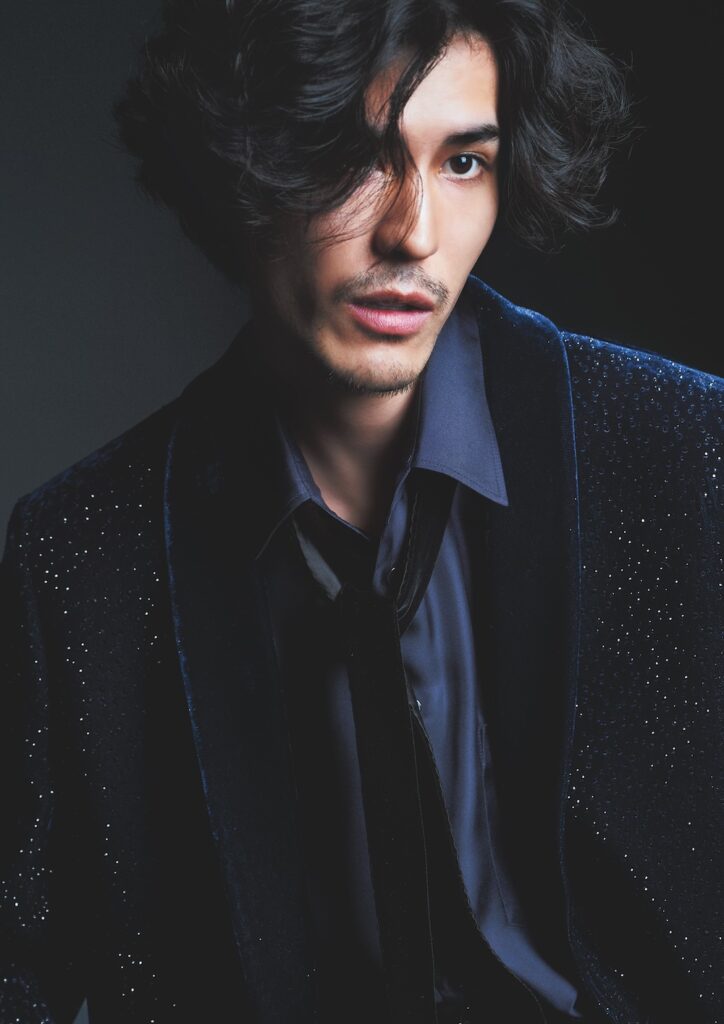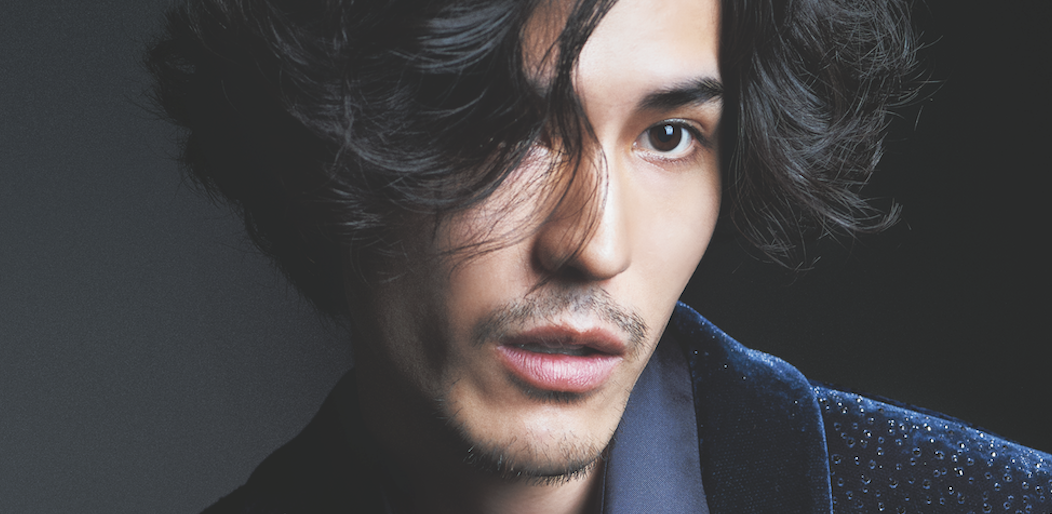GIORGIO ARMANI has created a number of innovative wear pieces, and been a remarkable success story. Kanichiro, the actor who has made a leap with diligence and a natural talent for actin, wears these magnificent pieces of clothing. Fate is something that you have to carve out for yourself. If you do so, you will naturally become a shining presence that shows the others the way.

How was the shoot today?
Being an actor, I don’t often get to wear such glamorous costumes on set, so I was excited to wear clothing that I don’t usually get to, and it was fun.
Is there any styling that left a strong impression on you?
The sparkly jacket was particularly memorable since I rarely get the chance to wear something like that, so seeing myself in such clothing felt very fresh. The styling with the rider’s jacket, shirt, and tie was also impressive because it felt like something I might wear in my daily life. I loved all the styles for this shooting, but since I like formal yet slightly punk- style clothing, these two looks were especially fun to wear – one was from a completely different world, and the other felt somewhat familiar to my usual style.
It’s been 8 years since your debut as an actor in 2017. Do you feel any changes in yourself? Conversely, is there anything that hasn’t changed since your debut?
While my outward appearance and what others might see have naturally changed with age, I think the core aspects and values I hold inside haven’t changed much. Regarding what I want to do, I feel very fortunate to be in an environment where I can continue to pursue it since then without change.
You acted in the NHK Taiga drama and starred in the movie “Sisam” which depicted the history of the indigenous Ainu and Wajin (those Japanese settler ancestry) in early Edo period Hokkaido. How did you find performing in works with cultural content?
In the NHK Taiga drama “The 13 Lords of the Shogun,” I played the role of Kōgyō, a historical figure. I felt pressure of course, but I could learn about the history of that period, and I found it very rewarding to perform. It’s really interesting to spend time thinking about people from back then and imagining what kind of person they were and what they might have thought. I would be very happy if viewers become interested in learning more about these historical figures and their times after watching my works.
When you get a role in a historical piece, do you learn extensively before filming?
I wouldn’t say extensive, but I try to prepare as much as I can, and as long as it’s respectful.
After performing in historical works like the NHK Taiga drama and “Sisam,” did you experience any new realizations or changes within yourself?
Playing roles from different time periods means learning about those periods. The moral values of those times were inevitably different from today’s. Rather than realizations, I naturally spend more time thinking “I might have fit better in that period” or “I wonder what it would have been like to be born and live then,” and even that contemplation is fun for me. The Edo period, for instance, is really cool. I strongly admire the people who lived under the ethical code of Bushido. While many people today might not have a clear sense of purpose, I think those people who lived under Bushido to serve others and were willing to give their lives for their masters always knew “what they lived for.” Their purpose in life was determined from birth. In a way, I envy that.
You’ve acted for many Jidaigeki (Japanese historical drama). What do you find appealing and challenging about Jidaigeki?
First of all, I think the appeal of Jidaigeki is very interesting visually. You can observe and experience people from the past whose architecture, clothing, and hairstyles were completely different from today’s, and it’s entertaining as well, which I think is wonderful. However, if we depict historical figures exactly as they were, some aspects might be incomprehensible to modern audiences. So while these are historical dramas, I think they’re created as “contemporary historical period dramas” that find common ground between the thoughts of historical figures and modern people. Jidaigeki made in the Showa era are quite different from those made in the Reiwa era, and that’s part of what makes them interesting and appealing. As for the challenges of acting in those dramas, it’s the differences in language and mannerisms. It’s hard to naturally play characters from a different era and make their way of life seem natural.
You’ve acted in nature-based movies like “Promised Land.” Are there any particularly challenging scenes or memorable episodes from filming in natural environments?
I had a scene where I went into a river, and the water from the snowy mountains was shockingly cold. However, I haven’t found climate-related challenges like cold or heat particularly challenging. Rain and natural disasters can affect filming, which can often be overcome with patience. The mental aspects of figuring out how to approach scenes during filming are harder than physical challenges. Even when playing characters who live in nature, while dealing with nature itself can be challenging, it feels somewhat disconnected.
How was the atmosphere at the Cannes Film Festival when you went there as the cast of the movie “Namibia of Desert”?
It was truly festive. Just being abroad was exciting, and it was fun. I think everyone there seemed to love movies and came to see them, so that I felt the whole part of the festival was welcoming to us.
Did you notice anything about the international film industry’s response to Japanese films at Cannes?
In Japan, audiences rarely share their impressions and thoughts about the movie with us soon after watching, but at Cannes, people would tell their thoughts right after leaving the theater, which made me really happy. The actors, director, and audience all watched the movie together, sometimes laughter would break out at the same scenes, and other times I was surprised by where people were laughing. In my impression, the French tend to laugh at more cynical scenes than the Japanese. But regardless of nationality, I was relieved to find that some things, like conflicts between men and women, are universal.
In “Grand Maison Tokyo” and the upcoming movie “Grand Maison Paris” (scheduled for release on December 30, 2024), you played with Ai Tominaga, who is on the cover of this issue. Do you have any episodes with her?
This might sound disrespectful, but she is amazing as an “object” in terms of her very existence. However, she’s actually very friendly. I once went dinner with the Grand Maison cast members – it was Ai Tominaga, Yuta Tamamori, Ayako Yoshitani, and myself. She talked to everyone and seemed to laugh at everything. So I think there’s a gap between her striking appearance and her personality, and I have a very strong impression of her kindness.
Please tell us about the highlights of the drama “HEART ATTACK” in which you co-star with Toko Miura.
I think it’s becoming a work where director Takeshi Maruyama, an intriguing visual director, is using film techniques to do something that hasn’t been done before – a near-future story that seems like it’s been told before but hasn’t really. The cast, full of unique up-and-coming actors, is gathering.
Are there any roles you’d like to try in the future?
Actually, I don’t have any particular roles I want to play. Instead, I’d like to try various approaches to each role I take on. Since we’re making two-dimensional scripts turn into three-dimensional performances, I hope I can express something like “humanity” that can’t be conveyed through just words or text.
Is there any message or something you’d like to share through your expression as an actor?
Our job as actors isn’t like musicians who create something and convey their own intentions to the audience, so I don’t really have any personal messages I want to share. Of course, I think there are messages that the work as a whole wants to tell, but I want to focus on giving fantastic and intriguing performances by thoroughly committing to the roles given to me. I’d like to keep express myself in that way.
The theme of this issue is “CHARISMATIC”. What kind of person do you think has charisma?
I’d actually like to ask everyone this question (laughs). The word charisma itself is quite abstract, but I think people with strong convictions have charisma. And also, people who have uniqueness and are distinctive have charisma, in my opinion.
Do you think charisma is something that comes naturally? Or is it something that can be developed through effort?
I think charisma includes both innate and acquired elements, but honestly, I feel the innate traits might be more significant.
Are there people around you that you feel have “charisma”? Could you also tell us why?
There are many. I think this industry is a place where many people gather with charisma in various categories. However, not having charisma isn’t necessarily a bad thing. In my impression, people with it can sometimes be somewhat arrogant or have the power to control situations. If everyone were like that, this industry wouldn’t function, so I think charisma has both positive and negative aspects.
How do you express your individuality in acting?
I use my own body to play each role, so I think my individuality naturally comes through, and it probably varies depending on the role.
What do you think are your appealing points and unique characteristics?
Maybe my cheeky side (laughs). To put it in better words, I treat everyone equally. Basically, I’m consistent with everyone and don’t change my attitude depending on who they are.
How do you spend your time when you have a chance to relax?
I just spend time quietly at home without meeting anyone. When someone else is around, we often need to be considerate in some way, so it’s hard to truly relax. That’s why I feel most relaxed when I’m alone, showing sides of myself that I can’t show elsewhere. Of course, going out and eating with friends is also blissful, but when it comes to relaxing, I often spend time completely alone, like driving somewhere or going to a sauna.
Are there any recent movies or shows that particularly impressed you?
“Challengers.” It was excellent, and it made me think “This is how entertainment should be!”
In your life, not as an actor but as a person, is there anyone you respect or who has influenced you?
That is my mother. She’s someone who lives outside my own experience and has always had a sense of humor. She can be quite troublesome, but there’s something charismatic about her, and being troublesome makes her all the more fascinating. In that sense, I’ve come to recognize my mother’s charm in recent years.
Do you have any dreams or goals for the future as an actor?
I have many specific ones. If I were to mention a big dream or goal, I’d like to see big fireworks. It doesn’t mean fireworks themselves, I mean it’s “achieving something” or “something changing.” Hopefully, I can see truly big fireworks during my lifetime. It would be fine whether I shoot off them myself or see them as a third party.
Is there anything you’d like to achieve before entering your 30s?
I don’t really think much about age, but 30 is a round number, so I might naturally be conscious of it. I probably haven’t fully lived out my 20s yet because I feel like I still don’t want to end my 20s. So I want to run through my 20s until the very end and try various things.
Model:KANICHIRO(humanité) Photography:SHIGERU MASUI(AOI Pro. GLOBAL) Styling:RYOTA KOUJIRO Hair&Makeup:TAKAI Interview:SEIKA ARAI Edit:SEIRA MAEHARA

